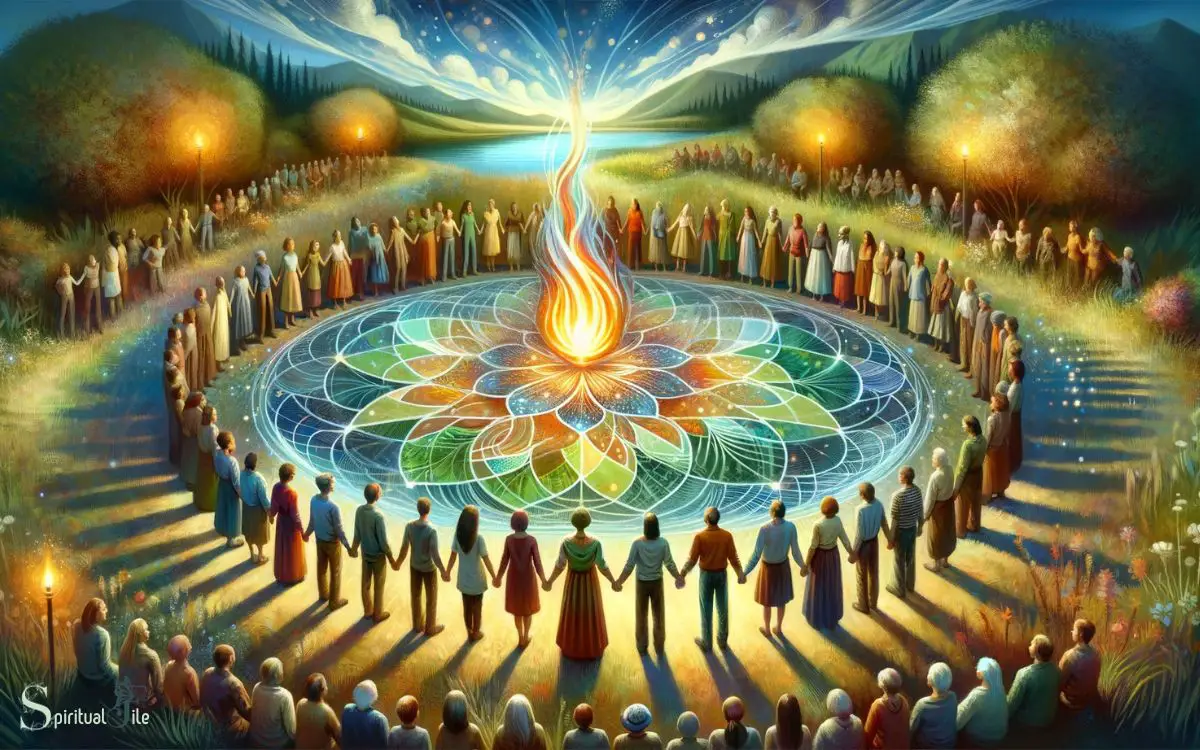Center for Spiritual Living Vs Christianity: Unique Beliefs!
The Center for Spiritual Living (CSL) and Christianity are two distinct religious paths with unique beliefs and practices. CSL is rooted in New Thought philosophy, emphasizing personal growth and spiritual enlightenment through metaphysical principles.
Christianity, based on the life and teachings of Jesus Christ, focuses on salvation through faith and the grace of God.
CSL, originating from the New Thought movement, promotes the idea that individuals can achieve a higher spiritual reality and manifest personal change through affirmative prayer, meditation, and positive thinking.
Christianity, with its origins in Judaism, centers around the belief in one God, the divinity of Jesus Christ, and the Bible as the sacred scripture.

Key Takeaway
9 Aspects: Center for Spiritual Living Vs Christianity
| Aspect | Center for Spiritual Living | Christianity |
|---|---|---|
| Belief in God | Belief in a higher power or universal energy, often referred to as the “Infinite Intelligence” or “Divine Presence.” | Belief in the Holy Trinity, consisting of God the Father, God the Son (Jesus Christ), and God the Holy Spirit. |
| Sacred Texts | Utilizes various spiritual and philosophical texts but doesn’t emphasize a specific holy scripture. | Primarily follows the Bible, including the Old Testament and New Testament. |
| Religious Leader | Centers often led by spiritual leaders or ministers, with no central religious authority figure. | Typically led by priests, pastors, or clergy, often under the guidance of a hierarchical church structure. |
| Worship Practices | Emphasizes meditation, positive affirmations, and spiritual practices to connect with the Divine Presence. | Involves traditional religious practices such as prayer, sacraments, and church services. |
| Salvation and Afterlife | Focuses on personal spiritual growth and realization of one’s divine nature; no standardized concept of salvation or afterlife. | Belief in salvation through faith in Jesus Christ and the promise of eternal life in heaven or eternal separation from God in hell. |
| Religious Symbols | May use symbols like mandalas, candles, and other spiritual symbols, but no universal religious symbols. | Utilizes symbols like the cross, fish (ichthus), and others, with the cross being a central Christian symbol. |
| Religious Diversity and Inclusivity | Often inclusive and open to various spiritual beliefs, promoting unity and personal growth. | Different denominations and variations, with varying degrees of inclusivity and doctrinal differences. |
| Religious Community | Emphasizes building a supportive and spiritually focused community of like-minded individuals. | Features diverse Christian denominations and congregations with their own distinct traditions and beliefs. |
| Leadership Authority | Relatively decentralized with individual Centers having autonomy; no central governing body. | Different Christian denominations may have centralized leadership structures or autonomy. |
Origins and Foundational Beliefs

Originating in the early 20th century, the Center for Spiritual Living professes a belief system rooted in New Thought philosophy, emphasizing the power of positive thinking and the interconnectedness of all life.
This spiritual movement, founded by Ernest Holmes, seeks to understand the principles of universal spiritual laws, acknowledging the presence of a creative intelligence within all individuals.
The foundational belief revolves around the idea that our thoughts and beliefs shape our experiences, and by aligning our consciousness with the divine, we can manifest positive outcomes in our lives.
The Center for Spiritual Living promotes the idea that individuals have the power to co-create their reality with the universe.
This emphasis on personal empowerment and the interdependence of all life distinguishes the Center for Spiritual Living from other belief systems.
This understanding of foundational principles directly influences the Center for Spiritual Living’s views on deity and divine.
Views on Deity and Divine

The Center for Spiritual Living’s understanding of universal spiritual laws and the power of positive thinking directly influences its perspective on deity and divine.
Divine Intelligence: Center for Spiritual Living believes in a universal intelligence, often referred to as God, Spirit, or the Universe, which is the source of all creation and is present in everything.
Non-Personal Nature of Deity: Unlike traditional Christian beliefs in a personal God, the Center for Spiritual Living sees the divine as an impersonal force, a universal energy that is accessible to everyone.
Co-Creative Relationship: Followers are taught to co-create their reality with the divine through their thoughts, beliefs, and actions, emphasizing the power of positive thinking and the law of attraction in manifesting their desires.
Scriptures and Sacred Texts

The comparison of the Center for Spiritual Living and Christianity in terms of scriptures and sacred texts brings to light the varied perspectives on interpretation and authority within these faith traditions.
The diverse beliefs and perspectives regarding sacred texts provide an interesting point of comparison between the two spiritual paths.
Understanding how each tradition approaches and values its scriptures offers valuable insight into the differences and similarities between the Center for Spiritual Living and Christianity.
Interpretation and Authority
An inherent aspect of the theological divergence between Center for Spiritual Living and Christianity lies in their contrasting interpretations and authorities regarding scriptures and sacred texts.
Interpretation:
- In Center for Spiritual Living, scriptures are often interpreted metaphorically and symbolically, emphasizing the universal spiritual principles they contain.
- Christianity, on the other hand, tends to place more emphasis on the literal interpretation of the Bible, viewing it as the infallible word of God.
Authority:
- Center for Spiritual Living places authority on individual understanding and experience, encouraging personal interpretation and application of spiritual truths.
- Christianity generally adheres to the authority of clergy, church tradition, and the teachings of the church hierarchy in interpreting and applying sacred texts.
Relevance:
- This divergence in interpretation and authority significantly impacts the understanding of moral and spiritual principles, the nature of God, and the path to salvation in these respective belief systems.
Diverse Beliefs and Perspectives
Divergent Interpretations and Authorities on scriptures and sacred texts further underscore the contrasting theological perspectives between Center for Spiritual Living and Christianity.
| Center for Spiritual Living | Christianity |
|---|---|
| Considers diverse sources of wisdom, including the Bible, Torah, Bhagavad Gita, and Quran. | Regards the Bible as the primary and authoritative scripture. |
| Advocates for personal interpretation and finding truths across various religious texts. | Emphasizes the importance of interpreting the Bible within the framework of established theological doctrines. |
| Encourages individuals to seek spiritual truths that resonate with them personally. | Views the Bible as the inspired word of God and the ultimate source of spiritual guidance. |
These differing approaches to scriptures and sacred texts shape the beliefs and practices within each faith tradition. This variation in beliefs paves the way for a deeper exploration of the contrasting perspectives on the concept of salvation and afterlife.
Concept of Salvation and Afterlife

A fundamental difference between the Center for Spiritual Living and Christianity lies in their respective understandings of salvation and the afterlife.
Christianity: Christians believe in the concept of original sin, where all humans are born with sin due to the fall of Adam and Eve.
They believe that salvation is attained through faith in Jesus Christ as the Son of God, who died for the forgiveness of sins. Afterlife in Christianity involves either eternal life in heaven or eternal separation from God in hell, based on one’s acceptance or rejection of Jesus.
Center for Spiritual Living: This organization emphasizes the innate goodness of all individuals and their connection to the divine. They focus on personal transformation through spiritual practices and the realization of one’s inner divinity.
The afterlife is seen as a continuation of the soul’s journey, with the emphasis on spiritual evolution rather than reward or punishment. Salvation, in this context, is the realization of one’s true nature and potential.
Worship Practices and Rituals

How do the worship practices and rituals of the Center for Spiritual Living differ from those of Christianity in light of their respective beliefs about salvation and the afterlife?
| Center for Spiritual Living | Christianity |
|---|---|
| Emphasizes individual spiritual growth through affirmative prayer and meditation. | Focuses on communal worship, sacraments (such as baptism and communion), and liturgical rituals. |
| Encourages the use of spiritual mind treatment, where individuals affirm their connection to the Divine. | Centralizes worship around the life, death, and resurrection of Jesus Christ. |
| Values diverse spiritual traditions and practices, incorporating teachings from various religions and philosophies. | Holds traditional Christian ceremonies and services, often following specific liturgical calendars. |
| Celebrates the presence of God in all, with a focus on inner transformation and the power of thought. | Centers on the belief in Jesus as the Son of God and the savior of humanity. |
These differences in worship practices and rituals stem from the distinct beliefs about salvation and the afterlife held by each faith tradition.
Community and Fellowship Dynamics

The dynamics of community and fellowship play a crucial role in the practice of spirituality. Spiritual support systems and inclusive social gatherings are essential components that shape the experiences and connections within a spiritual community.
Exploring how these dynamics differ between the Center for Spiritual Living and Christianity can provide valuable insights into the ways each tradition fosters and sustains a sense of belonging and support among its members.
Spiritual Support Systems
Spiritual support systems within Center for Spiritual Living and Christianity provide essential community and fellowship dynamics for their members.
Community Engagement: Both Center for Spiritual Living and Christianity emphasize the importance of community engagement. Members come together to provide emotional, spiritual, and sometimes even physical support to one another.
Fellowship Activities: Both religious communities organize fellowship activities such as potlucks, support groups, and social events. These activities create a sense of belonging and strengthen the bonds among members.
Mentorship and Counseling: Both spiritual support systems offer mentorship and counseling opportunities. These resources provide guidance, encouragement, and a listening ear for individuals navigating life’s challenges.
These support systems play a crucial role in nurturing individuals’ spiritual and emotional well-being, creating a sense of belonging, and fostering personal growth within the community.
Inclusive Social Gatherings
Inclusive social gatherings, encompassing community engagement and fellowship activities, play a pivotal role in nurturing the members’ spiritual and emotional well-being within both Center for Spiritual Living and Christianity’s support systems.
These social gatherings provide a platform for members to connect, share experiences, and support one another, fostering a sense of belonging and unity.
In Center for Spiritual Living, inclusive social gatherings often involve group meditation, spiritual discussions, and social events that promote a sense of community and understanding.
Similarly, in Christianity, fellowship activities such as communal meals, prayer groups, and outreach programs create opportunities for members to build relationships and express love and care for one another.
These inclusive social gatherings serve as a foundation for developing strong, supportive networks within the respective spiritual communities.
Transitioning into the subsequent section about ‘ethical and moral frameworks’, these inclusive social gatherings also serve as platforms for reinforcing and practicing ethical and moral values.
Ethical and Moral Frameworks

When comparing the ethical and moral frameworks of Center for Spiritual Living and Christianity, it is essential to analyze their foundational principles and belief systems.
Foundational Principles:
Center for Spiritual Living emphasizes the creative power of thought and the interconnectedness of all life, promoting the idea that individuals can shape their destinies through spiritual practices.
Christianity, on the other hand, centers around the belief in the divine nature of Jesus Christ and the redemption and forgiveness of sins through his sacrifice.
Ethical Guidelines:
Center for Spiritual Living encourages individuals to take responsibility for their actions and choices, emphasizing the importance of compassion, kindness, and personal growth.
Christianity, meanwhile, is guided by the moral teachings of Jesus, focusing on concepts such as love, forgiveness, and charity.
Belief Systems:
Center for Spiritual Living highlights the power of the individual mind in shaping experiences, while Christianity emphasizes faith in God’s plan and submission to His will.
These differing frameworks significantly influence the ethical and moral decision-making within each belief system.
This comparison lays a foundation for understanding how these frameworks influence the approach to spiritual growth and enlightenment in the subsequent section.
What are the unique beliefs and practices of the Center for Spiritual Living compared to Christianity?
The Center for Spiritual Living emphasizes spiritual formation practices vs sanctification found in traditional Christianity. They focus on the power of positive thinking and the belief in the interconnectedness of all things. This contrasts with the Christian focus on personal holiness and divine grace for salvation.
Approach to Spiritual Growth and Enlightenment

The approach to spiritual growth and enlightenment within the Center for Spiritual Living and Christianity is shaped by their respective foundational principles and ethical frameworks, guiding individuals toward a deeper understanding of their spiritual journeys.
Center for Spiritual Living emphasizes the concept of ‘spiritual mind treatment,’ focusing on affirmative prayer and meditation to align oneself with the divine presence and manifest desired outcomes.
It encourages individuals to recognize their inherent connection to the universe and the power of their thoughts in shaping their reality.
In contrast, Christianity emphasizes spiritual growth through a personal relationship with God, often involving practices such as prayer, studying scripture, and participation in communal worship.
The central focus is on surrendering to God’s will and seeking guidance through faith and obedience to biblical teachings, ultimately leading to spiritual enlightenment and a deeper connection with God.
Conclusion
In conclusion, the Center for Spiritual Living and Christianity differ in their origins, beliefs, and practices. While the former emphasizes spiritual growth and enlightenment, the latter focuses on salvation and afterlife.
Despite their differences, both paths offer individuals a means to connect with the divine and find meaning in life. Just as two rivers flow in different directions, these spiritual paths diverge but ultimately lead to the same ocean of universal truth.






